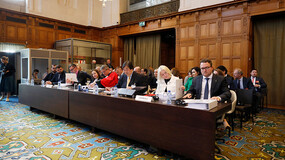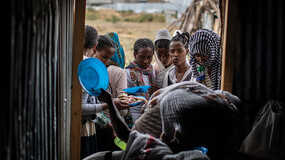
ISP Launches Third Digital Public Sphere White Paper Collection
Today, the Information Society Project (ISP) at Yale Law School published “Uniformity and Fragmentation in the Digital Public Sphere,” a collection of six essays that explores the increasing uniformity of the global digital public sphere.

In the News, Courts, and Classrooms, Attention Turns to Federal Indian Law
Yale Law School has expanded its offerings in federal Indian law, an increasingly topical area of study and practice in which student interest is growing.

DocProject Provides Legal Support for Film on Human Cost of Insulin Crisis
Students in DocProject provided legal review for Pay or Die, a new documentary about America’s insulin affordability crisis.

Professor Koh Argues at the International Court of Justice on Behalf of Ukraine
Sterling Professor of International Law Harold Hongju Koh was among the lawyers representing Ukraine at the International Court of Justice asking the court to declare Russia in violation of two international treaties.

Clinics Celebrate the Expansion of Parole Eligibility for Young People
Students in two Law School clinics advocated for a bill in the Connecticut General Assembly that expands parole eligibility for incarcerated people who committed crimes before they were 21 years old. Collaborative efforts between the clinics and outside organizations resulted in the passage of the bill on June 6.

Professor Bell Named Chair-Elect of ASA Sociology of Law Section
Professor of Law and Associate Professor of Sociology Monica C. Bell ’09 was elected Chair-Elect (and 2024–25 Chair) of the American Sociological Association (ASA)’s Sociology of Law section.

MFIA Research Fuels New Connecticut Law Regulating State Use of Algorithms
A landmark law to regulate use of artificial intelligence by Connecticut state government draws from research by the Media Freedom and Information Access Clinic at Yale Law School.

Lowenstein Clinic Finds Ethiopia and Allies Responsible for Mass Starvation in Tigray
A new report from the Lowenstein Clinic concludes, based on publicly available information, that Ethiopia and its allies violated international law by inflicting starvation on civilians in Tigray during the two-year-long war in the region.




